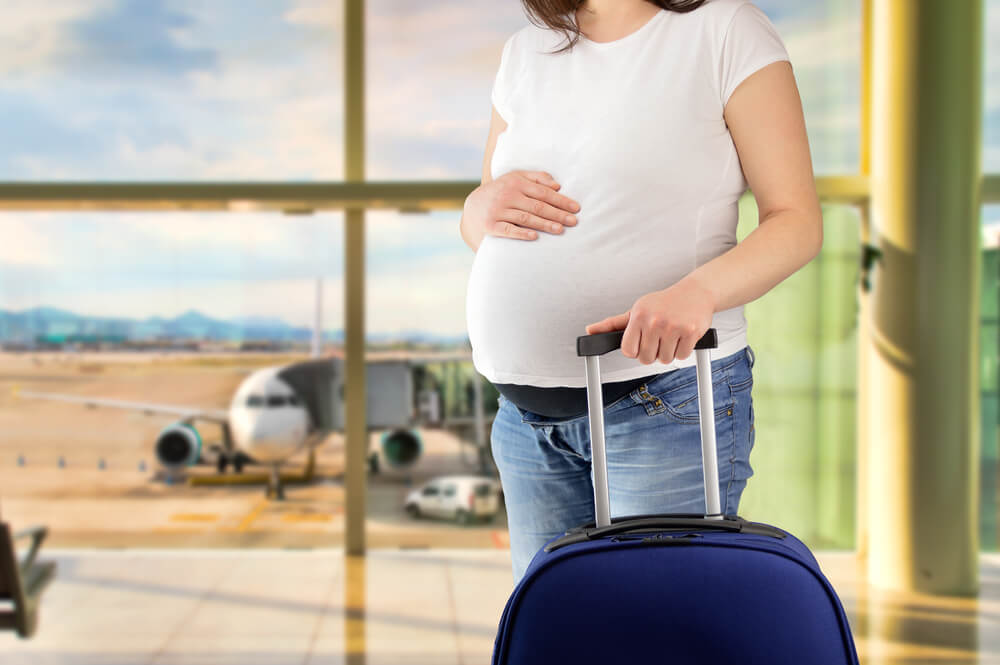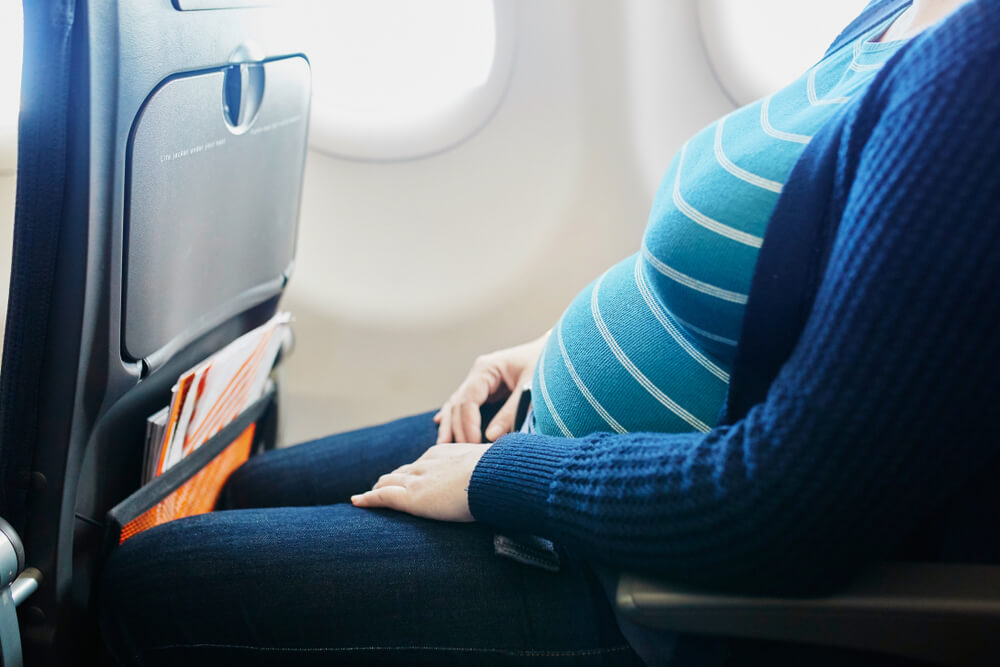Simply put, when it comes to pregnancy and travel, experts would usually agree that the second trimester is the safest time to travel while pregnant, provided that the expecting mother isn’t experiencing any concerning complications. If you are considering traveling while pregnant, the best thing you can do is to consult with your healthcare provider. And if your pregnancy is considered high-risk, scheduling an appointment with them is even more critical. Also, it’s vital to look closer at your travel destination and the standard of medical care it can provide. On that note, some countries offer arrangements for reciprocal healthcare, while in the case of developing nations, visiting some destinations might not be recommended to decrease the possibility of developing any diseases due to the lower standard of medical facilities.
In this blog post, the experts at My ObGyn Specialists have gathered all the information you need to know about pregnancy and travel, including the possible risks of flying while pregnant, and more.
Cases of High-Risk Pregnancy and Travel

First of all, if the expecting mother is experiencing any complications, travel is not advised. These complications will usually include:
- Carrying multiples.
- Vaginal bleeding.
- Cervical issues (incompetent cervix).
- A history of gestational diabetes.
- Prior miscarriages.
- Past or present placenta abnormalities
- Past or current problems with high blood pressure
- Past or present preeclampsia.
- Prior premature labor
- Previous instances of ectopic pregnancies (when the pregnancy starts to develop outside the womb).
Also, if the expecting mother is pregnant for the first time and older than 35, they will be advised to stay home.
Immunization Warnings and Pregnancy
If you are visiting a developing country, you might need to receive immunizations for specific diseases, like typhoid. Now, most of these vaccines haven’t been tested for pregnancy safety, while others can be potentially dangerous to developing fetuses.
The influenza vaccine is an essential exception to this, as it can be safely administered even during pregnancy. As a matter of fact, influenza shots are highly recommended to pregnant women because influenza can be very severe during pregnancy. Typically, virus vaccines like measles and mumps shouldn’t be given to pregnant women.
Other shots (for instance, for yellow fever) may be administered cautiously after the first trimester. Still, the best advice healthcare providers can give for pregnant mothers is to avoid visiting developing countries until their pregnancy is over.
Malaria Risks and Pregnancy
Malaria is an infectious disease transmitted by specific species of mosquitoes. For pregnant women, contracting malaria carries significant risks, including the potential for miscarriage, premature labor, and stillbirth. While certain antimalarial medications, such as chloroquine, are generally considered safe for use during pregnancy, others, like doxycycline, pose potential risks to the developing fetus. As a precautionary measure, it is strongly advised that pregnant women avoid traveling to regions where malaria is prevalent to minimize the risk of exposure and its potential adverse consequences.
Traveling While Pregnant: The Risks of Long-Distance Journeys
Extended periods of immobility during car, bus, rail, and air travel can elevate the risk of developing blood clots in the deep veins of the legs, a condition known as deep vein thrombosis (DVT). In some instances, these clots can dislodge and travel through the bloodstream, potentially lodging in critical areas of the body, like the lungs.
During pregnancy, the risk of DVT can be heightened if:
- There’s a history of DVT.
- If the expecting mother weighs over 220lbs.
- If family members have a history of DVT.
- If the mother is expecting multiples.
Approximately DVT will affect one in a thousand pregnant women, and research suggests that DVT is one of the most significant risks of flying while pregnant, as long-distance flights may increase DVT development by two to three times.
On that note, no concrete, research-based recommendations on traveling for pregnant women exist. Still, if expecting mothers choose to travel long-distance, they should:
- Regularly walk.
- Perform leg exercises frequently.
- Drink plenty of water.
- Minimize caffeine intake.
Pregnancy And Air Travel
Before opting for air travel, pregnant women should:
- Be aware that air travel may cause premature labor in the last six weeks of pregnancy.
- Discuss potential risks with their doctor. For example, pregnant women with high-risk pregnancies usually should not board a plane.
- You should try booking an aisle seat as going for walks and to the toilet will be easier.
- Check whether the travel insurance covers pregnancy.
- Some airlines prohibit women who are past their 35th week of pregnancy from flying.
- Arrange for a bulkhead seat with the airline for extra legroom near the exit.
If you get the green light, schedule an appointment with your doctor to discuss whether you will need a pregnancy medical kit, which you should pack as carry-on luggage to make it readily available during the flight.
This kit should include:
- Multivitamins for pregnant women
- Urine dipsticks to check blood sugar levels.
- Oral rehydration preparations.
- Medication for hemorrhoids, constipation, heartburn, or thrush.
Pregnancy and Air Travel: While on the Flight
During the flight, expecting mothers should:
- Wear their seatbelt across their lap and under their bump.
- Drink enough water to combat dehydration. This will also reduce the risks of developing DVT.
- Go for frequent walks along the aisles every 30 minutes if the flight is smooth.
- If there’s a lot of turbulence, pregnant women can stay in their seats, but they may extend and flex their ankles often.
- Pregnant women may ask for breathing oxygen from flight attendants if they are feeling light-headed or shortness of breath.
- They should also move around and stretch their legs while seated.
- Wearing support stockings can improve circulation.
Traveling in Hot Weather
To avoid the negative effects of sun exposure, pregnant women should:
- Stay in the shade during the hottest parts of the day.
- Drink water frequently.
- Use sunscreen to protect their skin.
- Avoid overexertion.
If you experience sensations of weakness, dizziness, light-headedness, or mild nausea, it could indicate overheating and dehydration.
It is advisable to:
- Find shade or move indoors, ingest a glass of cold water, and recline.
- Lower your body temperature by utilizing a fan, applying a cool, damp cloth to your forehead and the nape of your neck, or running cool water over your wrists.
- Remember that dizziness might also signal a decrease in blood sugar levels, so consider consuming a light snack like a banana or a slice of toast.
Avoiding Traveler’s Diarrhea While Pregnant

Naturally, pregnant women should also avoid food poisoning as some of these infections may harm the baby or, even worse, lead to miscarriage.
As such, remember to:
- Steer clear of seafood, soft cheese, buggets, and undercooked meals.
- Practice good hygiene when preparing food, going to the toilet, or before eating.
- Opt for bottled water.
- Avoid ice.
For More Information, Reach Out
While traveling is generally always exciting and fun, if you are pregnant, sometimes, you will need to be extra careful to bring the most out of your journey and avoid complications. If you want to ensure that nothing will cause issues during your vacation, consider scheduling an appointment with us. We are ready to help you answer all of your questions or concerns. We are also here to help you assess your current state to see whether you are fit to travel or not.
Remember, in pregnancy, the baby’s and your safety come first.


